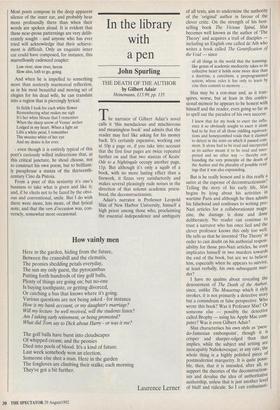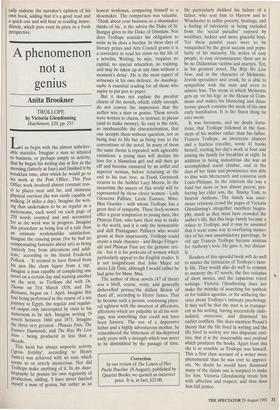In the library with a pen
John Spurling
THE DEATH OF THE AUTHOR by Gilbert Adair Heinemann, £13.99, pp. 135 The narrator of Gilbert Adair's novel calls it 'this mendacious and mischievous and meaningless book' and admits that the reader may feel like asking for his money back. It's certainly expensive, working out at 10p a page or, if you take into account that the first four pages are twice repeated further on and that two stanzas of Keats' Ode to a Nightingale occupy another page, 11p. But although it's only a squib of a book, with no more lasting effect than a firework, it fizzes very satisfactorily and makes several pleasingly rude noises in the direction of that solemn academic priest- hood, the deconstructionists.
Adair's narrator is Professor Leopold Sfax of New Harbor University, himself a high priest among those who, proclaiming the essential independence and ambiguity
of all texts, aim to undermine the authority of the 'original' author in favour of the clever critic. On the strength of his best- selling book The Vicious Spiral, Sfax becomes well known as the author of 'The Theory' and acquires a trail of disciples including an English one called de'Ath who writes a book called The Gentrification of the Void — since
of all things in the world that the lemming- like genus of academic mediocrity takes to its collective heart it holds none more dear than a doctrine, a catechism, a preprogrammed system, whose rules it has only to learn by rote then commit to memory ...
Sfax may be a con-man and, as it tran- spires, worse, but at least in this confes- sional memoir he appears to be honest with himself and the reader, even going so far as to spell out the paradox of his own success:
I knew that for my book to exert the influ- ence it so obviously sought to exert it alone had to be free of all those riddling equivoca- tions and honeycombed voids that it claimed to detect in the texts on which it passed com- ment. It alone had to be read and interpreted as its author meant it to be read and inter- preted and no other way — thereby con- founding the very principle of the death of the Author and the plurality of possible read- ings that it was also expounding.
But is he really honest and is this really a satire at the expense of deconstructionism? Telling the story of his early life, Sfax begins by lying about his activities in wartime Paris and although he then admits his falsehood and confesses to writing pro- Nazi articles for a collaborationist maga- zine, the damage is done and done deliberately. No reader can continue to trust a narrator who has once lied and the clever professor knows this only too well. He tells us that he invented 'The Theory' in order to cast doubt on his authorial respon- sibility for those pro-Nazi articles, he even implicates himself in two murders towards the end of the book, but are we to believe him, especially when he appears to survive, at least verbally, his own subsequent mur- der?
I have no qualms about revealing the denouement of The Death of the Author, since, unlike The Mousetrap which it slyly invokes, it is not primarily a detective story but a conundrum or false perspective. Who wrote this book? Was it Professor Sfax? Or someone else — possibly the detective called Brophy — using his Apple Mac com- puter? Was it even Gilbert Adair?
Sfax characterises his own style as 'pseo- do-Jamesian embonpoint', though it is crisper and sharper-edged than that implies, while the subject and setting are inescapably Nabokovesque; at any rate, the whole thing is a highly polished piece of postmodernist marquetry. It is quite possi- ble, then, that it is intended, after all, to support the theories of the deconstruction- ists and devalue the idea of authoritative authorship, unless that is just another level of bluff and ridicule. So I can enthusiasti- cally endorse the narrator's opinion of his own book, adding that it's a good read and a quick one and will bear re-reading imme- diately, which puts even its price in a fresh perspective.



















































 Previous page
Previous page